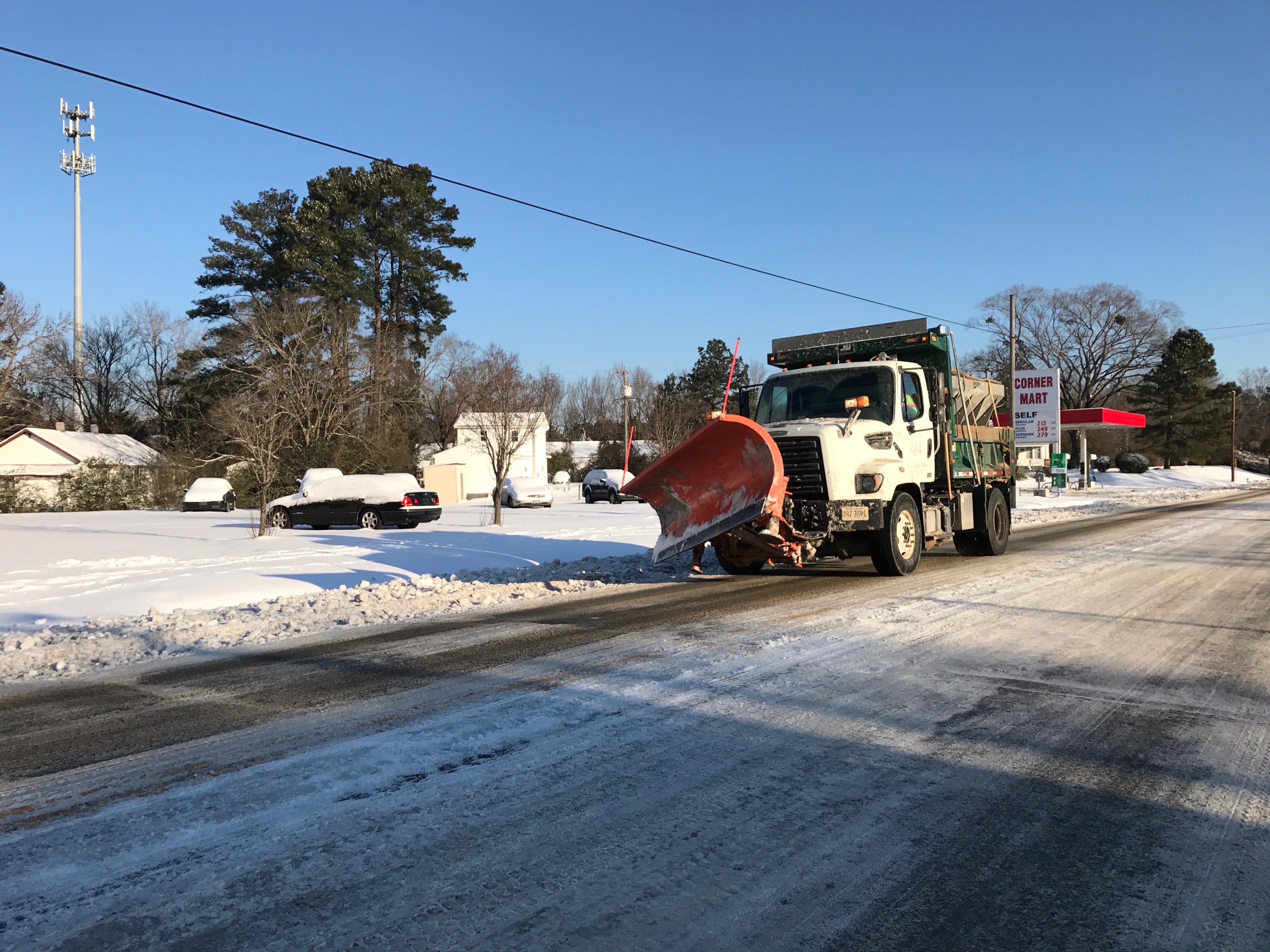City officials warn of dangerous conditions
Published 4:56 pm Sunday, January 8, 2017

- A Suffolk snowplow heads down the road on Sunday. Suffolk Public Works employees have been working around the clock to get roads clear since early Friday morning. John Carr/Suffolk News-Herald
With temperatures never climbing out of the 20s on Sunday, road conditions throughout the city continue to be perilous in many places.
“Suffolk Public Works crews have been working around the clock since before the storm even arrived to keep our roads as clear as possible,” city spokeswoman Diana Klink stated in a press release Sunday afternoon. “Even with the treatment and plowing, roads are slick. Due to continued extremely cold temperatures and icy conditions, motorists are urged to stay off the roads.”
In a special weather statement released at 3:28 p.m., the National Weather Service warned that an arctic high pressure system expected to settle over the region Sunday night would bring overnight temperatures in the single digits, with some rural areas expected to see the mercury fall to below zero.
With sunny skies on Sunday having melted some snow on the roads, the bitter temperature Sunday night will likely leave ice in many places.
“Travel will remain hazardous tonight and Monday morning,” the weather service warned.
Klink noted that public works employees had been on the job 24 hours a day since 4 a.m. Friday to prepare for and take care of the snow that Suffolk received Friday and Saturday.
“The department’s first priority is to make passable approximately 600 lane-miles of primary roads and additional lane-miles of priority streets that access hospitals, fire stations and police stations,” she stated.
“Most neighborhood streets are not cleared, because parked vehicles and other safety considerations make snow removal from these streets impractical. Problematic roadways into and out of some neighborhoods will be treated and/or plowed as supervisors investigate if the equipment can safely work in such areas.”
City officials shared a list of suggestions for residents.
If travel is absolutely necessary:
- Make sure your vehicle is ready for winter and is in safe driving condition. Keep an emergency kit in your car. Include items such as jumper cables, blankets, first aid kit, water, non-perishable food, cat litter or sand, shovel, flash light and batteries, ice scraper and cell phone charger.
- Visit www.511virginia.org or call 5-1-1 for road conditions.
- Let someone know where you are going and what route you’re taking.
- Remove all snow from your vehicle before driving.
- Drive with caution – Reduce your speed and increase following distances.
- Don’t crowd snow plows or emergency vehicles – give emergency crews plenty of room to work.
Take extra care with cold temperatures:
- Stay indoors and stay warm. Dress in layers and reduce exposure to the cold.
- With the bitter cold temperatures, the Virginia Department of Health reminds everyone that frostbite and hypothermia are serious concerns and urges us to dress appropriately for the cold weather. If spending time outside; monitor the time you and others are outside, especially children.
- If working outside, pace yourself; don’t over exert, take frequent breaks.
- Be sure to check on others, especially if they are older or infirm.
- Learn the signs of frostbite and hypothermia on the Virginia Department of Health website.
If you have power-dependent medical equipment, keep all batteries at full charge in case you lose power. - In a life threatening emergency, call 9-1-1 for help immediately
- Keep your cell phone charged in case of a power outage.
- Bring pets inside from the cold. If they do need to go outside try to minimize their exposure to cold weather.
- Use caution when shoveling snow.
- Limit your exposure to cold, stay hydrated, lift with your knees, and do not over-exert yourself
- If you need help, information or resources during the storm, call 2-1-1.
- Those with hearing impairments can call 7-1-1 for the Virginia Relay Center and then call 1-800-230-6977. Out-of-state or videophone users may also dial 1-800-230-6977 for assistance.
- Download the free Ready Virginia mobile app.
If the power goes out, be sure to take the following precautions:
- Report power outages to your power company.
- If you have power-dependent medical equipment, make sure all batteries and extra batteries are fully charged.
- Know where to go if you lose power during or after the storm. If you aren’t sure where to go, dial 2-1-1 for a list of shelters or charging stations that may be open in your area.
- Stay warm by wearing layered clothing, gloves, hats, and/or blankets.
- Make sure you drink plenty of clean drinking water.
- Keep your refrigerator and freezer closed as long as possible.
- Throw away perishable foods (including meat, poultry, fish, eggs and leftovers) in your refrigerator when the power has been off for 4 hours or more. Thawed food that contains ice crystals can be refrozen or cooked. Freezers, if left unopened and full, will keep food safe for 48 hours (24 hours if half full).
- Do not use charcoal, generators, grills or similar devices inside. Use these devices outside if necessary, as intended, and do not connect generators to your home electrical system.
- Check on friends, family, neighbors, the elderly and those with medical needs.


